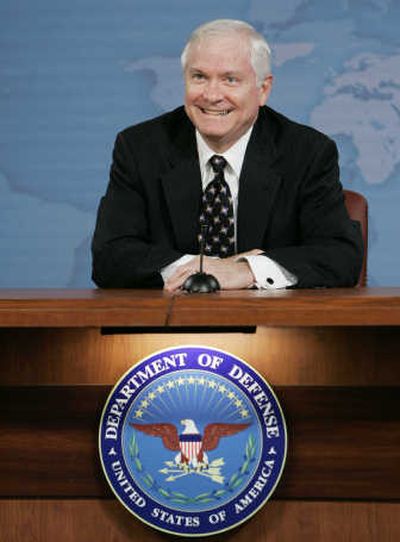Gates: U.S. misjudged Iraq politics

ABU DHABI, United Arab Emirates – U.S. Secretary of Defense Robert M. Gates acknowledged Thursday that the Bush administration underestimated the difficulty of getting a political truce in Iraq, where the government of Prime Minister Nouri al-Maliki has been crippled by a walkout of Sunni Muslim ministers.
Gates insisted that he was optimistic about military progress in several Iraqi regions, particularly western Anbar province, which was once a haven for extremist insurgents.
But he said he was discouraged by the inability of Iraq’s Shiite-led government to reach a compromise on legislation aimed at reconciling the country’s ethnic and sectarian groups. Reaching such political agreements, a central goal of the ongoing troop buildup in Iraq, may still be long off, he said.
“I just think in some ways we probably all underestimated the depth of the mistrust and how difficult it would be for these guys to come together,” Gates said.
Gates’ remarks Thursday were his closest yet to conceding the Bush administration’s top political priorities for Iraq might not occur during the surge, even if it extended into next spring, the latest the military could sustain the increase. He is the top Bush administration official to express such skepticism publicly.
The Defense secretary made the remarks to reporters traveling on his plane while heading back to Washington after a three-day, four-country visit to urge Sunni Arab allies to do more to support al-Maliki’s government.
Although Gates testified on Capitol Hill that he would like to see the surge end by December, a senior Defense official familiar with his thinking said those views had “been overtaken by events.” Gates, the official said, is awaiting next month’s evaluation from Army Gen. David H. Petraeus, the top U.S. military commander in Iraq, to decide how long to continue the current security plan.
The Bush administration’s benchmarks for progress include passing laws to divide the nation’s oil wealth, setting dates for provincial elections, and allowing members of dictator Saddam Hussein’s party, predominantly Sunnis, to obtain government jobs and pensions.
Gates highlighted progress being made in local and provincial governments, a further sign that Pentagon strategy may be shifting away from trying to impose a top-down solution to Iraq’s sectarian conflicts.
In Baghdad, al-Maliki’s Shiite Muslim party on Thursday urged Iraq’s main Sunni Arab bloc to reconsider its decision to quit the Cabinet. Al-Maliki had not accepted the resignations Thursday, said Sami Askari, an aide to the prime minister and member of his Islamic Dawa Party.
U.S. officials had hoped the inclusion of Sunni Arabs in al-Maliki’s Cabinet would give them a stake in Iraq’s political process and undercut support for the insurgency. But a year later, Sunni politicians complain they have nothing to show for their participation.
At least 28 Iraqis were reported killed by bomb blasts, mortar fire and other violence Thursday. In the worst of the incidents, a suicide bomber drove his explosives-laden car into a crowd of recruits at a police station northeast of the capital, killing at least 13 people and injuring 15 others, police said.
The U.S. military also announced the deaths of two soldiers, one during combat operations in a western section of Baghdad on Thursday, and another Wednesday near the southern port city of Basra.